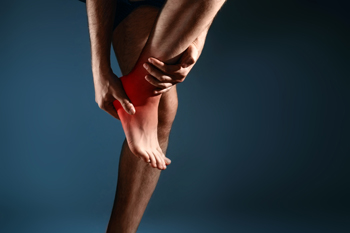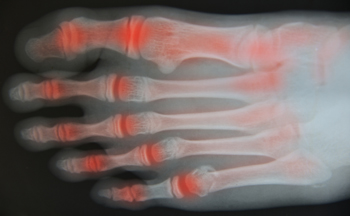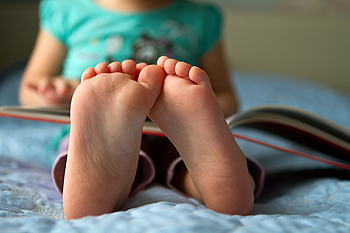October 2020
Who Does Sever’s Disease Affect?
 Children and young teenagers who frequently participate in sporting activities may complain of heel pain. This may be indicative of a condition that is referred to as Sever’s disease which affects the growth plate in the heel. Sever’s disease can be a common ailment among gymnasts, and specific symptoms often accompany it. These can include swelling, pain, and difficulty walking. Mild relief may be found when the patient walks on tiptoes, and when the affected foot is elevated. The healing process can include performing certain foot stretches, and it may be beneficial to wear a protective boot. If your child has heel pain, please speak with a podiatrist, who can effectively treat Sever’s disease, as quickly as possible.
Children and young teenagers who frequently participate in sporting activities may complain of heel pain. This may be indicative of a condition that is referred to as Sever’s disease which affects the growth plate in the heel. Sever’s disease can be a common ailment among gymnasts, and specific symptoms often accompany it. These can include swelling, pain, and difficulty walking. Mild relief may be found when the patient walks on tiptoes, and when the affected foot is elevated. The healing process can include performing certain foot stretches, and it may be beneficial to wear a protective boot. If your child has heel pain, please speak with a podiatrist, who can effectively treat Sever’s disease, as quickly as possible.
Sever's disease often occurs in children and teens. If your child is experiencing foot or ankle pain, see Dr. Ronald K. Olm from Grand Traverse Foot & Ankle Center. Our doctor can treat your child’s foot and ankle needs.
Sever’s Disease
Sever’s disease is also known as calcaneal apophysitis, which is a medical condition that causes heel pain I none or both feet. The disease is known to affect children between the ages of 8 and 14.
Sever’s disease occurs when part of the child’s heel known as the growth plate (calcaneal epiphysis) is attached to the Achilles tendon. This area can suffer injury when the muscles and tendons of the growing foot do not keep pace with bone growth. Therefore, the constant pain which one experiences at the back of the heel will make the child unable to put any weight on the heel. The child is then forced to walk on their toes.
Symptoms
Acute pain – Pain associated with Sever’s disease is usually felt in the heel when the child engages in physical activity such as walking, jumping and or running.
Highly active – Children who are very active are among the most susceptible in experiencing Sever’s disease, because of the stress and tension placed on their feet.
If you have any questions, please feel free to contact one of our offices located in Traverse City and Kalkaska, MI . We offer the newest diagnostic and treatment technologies for all your foot and ankle injuries.
How Can I Tell if I Have Arthritic Feet?
 Arthritis is a common disease that affects the joints of a person’s body, including the joints of the feet. The severity of a person’s arthritis can vary, however most patients complain of a painful stiffness that they experience in their joints. Other common symptoms may include redness and swelling of the skin where the joints are feeling stiff and sore. Some patients have also expressed that they have difficulty walking and lack mobility and flexibility in their joints. For a proper diagnosis and advice on how to best treat arthritis in the feet and ankles, please speak with a podiatrist.
Arthritis is a common disease that affects the joints of a person’s body, including the joints of the feet. The severity of a person’s arthritis can vary, however most patients complain of a painful stiffness that they experience in their joints. Other common symptoms may include redness and swelling of the skin where the joints are feeling stiff and sore. Some patients have also expressed that they have difficulty walking and lack mobility and flexibility in their joints. For a proper diagnosis and advice on how to best treat arthritis in the feet and ankles, please speak with a podiatrist.
Arthritis can be a difficult condition to live with. If you are seeking treatment, contact Dr. Ronald K. Olm from Grand Traverse Foot & Ankle Center. Our doctor can provide the care you need to keep you pain-free and on your feet.
Arthritic Foot Care
Arthritis is a joint disorder that involves the inflammation of different joints in your body, such as those in your feet. Arthritis is often caused by a degenerative joint disease and causes mild to severe pain in all affected areas. In addition to this, swelling and stiffness in the affected joints can also be a common symptom of arthritis.
In many cases, wearing ill-fitting shoes can worsen the effects and pain of arthritis. Wearing shoes that have a lower heel and extra room can help your feet feel more comfortable. In cases of rheumatoid arthritis, the arch in your foot may become problematic. Buying shoes with proper arch support that contour to your feet can help immensely.
Alleviating Arthritic Pain
- Exercises that stretch the foot can prevent further pain and injury and increase mobility
- Most of the pain can be alleviated with anti-inflammatory drugs, heat, and topical medications
- Massages can help temporarily alleviate pain.
It is best to see your doctor for the treatment that is right for your needs and symptoms. Conditions vary, and a podiatrist can help you determine the right method of care for your feet.
If you have any questions, please feel free to contact one of our offices located in Traverse City and Kalkaska, MI . We offer the newest diagnostic tools and technology to treat your foot and ankle needs.
Wounds That Don't Heal Need to Be Checked
Teaching Children Proper Foot Care at an Early Age
 It is important for children to learn at an early age the necessity of properly taking care of their feet. A daily routine may consist of washing them thoroughly, especially between the toes, followed by completely drying the feet. Shoes may last longer when they are aired out after wearing them, and it can help to wash sneakers often, which can keep them soft. The medical condition that is known as athlete’s foot is generally accompanied by symptoms that can include itchy skin and small blisters. This condition can cause pain and discomfort, and may be common among children. It is considered to be contagious, and parents can teach their children to wear appropriate shoes while in public pools and surrounding areas, where fungus is more commonly spread. If you would like additional information about the importance of maintaining your child’s foot health, it is suggested that you consult with a podiatrist.
It is important for children to learn at an early age the necessity of properly taking care of their feet. A daily routine may consist of washing them thoroughly, especially between the toes, followed by completely drying the feet. Shoes may last longer when they are aired out after wearing them, and it can help to wash sneakers often, which can keep them soft. The medical condition that is known as athlete’s foot is generally accompanied by symptoms that can include itchy skin and small blisters. This condition can cause pain and discomfort, and may be common among children. It is considered to be contagious, and parents can teach their children to wear appropriate shoes while in public pools and surrounding areas, where fungus is more commonly spread. If you would like additional information about the importance of maintaining your child’s foot health, it is suggested that you consult with a podiatrist.
Making sure that your children maintain good foot health is very important as they grow. If you have any questions, contact Dr. Ronald K. Olm of Grand Traverse Foot & Ankle Center. Our doctor can provide the care you need to keep you pain-free and on your feet.
Keeping Children's Feet Healthy
Having healthy feet during childhood can help prevent medical problems later in life, namely in the back and legs. As children grow, their feet require different types of care. Here are some things to consider...
Although babies do not walk yet, it is still very important to take care of their feet.
Avoid putting tight shoes or socks on his or her feet.
Allow the baby to stretch and kick his or her feet to feel comfortable.
As a toddler, kids are now on the move and begin to develop differently. At this age, toddlers are getting a feel for walking, so don’t be alarmed if your toddler is unsteady or ‘walks funny’.
As your child gets older, it is important to teach them how to take care of their feet.
Show them proper hygiene to prevent infections such as fungus.
Be watchful for any pain or injury.
Have all injuries checked by a doctor as soon as possible.
Comfortable, protective shoes should always be worn, especially at play.
If you have any questions please feel free to contact one of our offices located in Traverse City and Kalkaska, MI . We offer the newest diagnostic and treatment technologies for all your foot and ankle needs.
Different Forms of Neuropathy
 Research has indicated that many patients who have neuropathy may be diabetic. Peripheral neuropathy is defined as nerve damage that can affect the feet, and can happen from elevated glucose levels in the blood. It can cause the inability to feel sensation, and there may be muscle weakness and slowed reflexes. Patients who have autonomic neuropathy may experience difficulty in swallowing, or have abnormal blood pressures and heart rates. Damage that is inflicted on the hips, thighs, or legs may be indicative of radiculoplexus neuropathy, and this may be linked to diabetes. An additional form of neuropathy is referred to as mononeuropathy, and this may cause difficulty in focusing the eyes. If you are experiencing weakness or a lack of sensation in your feet, it is strongly suggested that you are under the care of a podiatrist.
Research has indicated that many patients who have neuropathy may be diabetic. Peripheral neuropathy is defined as nerve damage that can affect the feet, and can happen from elevated glucose levels in the blood. It can cause the inability to feel sensation, and there may be muscle weakness and slowed reflexes. Patients who have autonomic neuropathy may experience difficulty in swallowing, or have abnormal blood pressures and heart rates. Damage that is inflicted on the hips, thighs, or legs may be indicative of radiculoplexus neuropathy, and this may be linked to diabetes. An additional form of neuropathy is referred to as mononeuropathy, and this may cause difficulty in focusing the eyes. If you are experiencing weakness or a lack of sensation in your feet, it is strongly suggested that you are under the care of a podiatrist.
Neuropathy
Neuropathy can be a potentially serious condition, especially if it is left undiagnosed. If you have any concerns that you may be experiencing nerve loss in your feet, consult with Dr. Ronald K. Olm from Grand Traverse Foot & Ankle Center. Our doctor will assess your condition and provide you with quality foot and ankle treatment for neuropathy.
What Is Neuropathy?
Neuropathy is a condition that leads to damage to the nerves in the body. Peripheral neuropathy, or neuropathy that affects your peripheral nervous system, usually occurs in the feet. Neuropathy can be triggered by a number of different causes. Such causes include diabetes, infections, cancers, disorders, and toxic substances.
Symptoms of Neuropathy Include:
- Numbness
- Sensation loss
- Prickling and tingling sensations
- Throbbing, freezing, burning pains
- Muscle weakness
Those with diabetes are at serious risk due to being unable to feel an ulcer on their feet. Diabetics usually also suffer from poor blood circulation. This can lead to the wound not healing, infections occurring, and the limb may have to be amputated.
Treatment
To treat neuropathy in the foot, podiatrists will first diagnose the cause of the neuropathy. Figuring out the underlying cause of the neuropathy will allow the podiatrist to prescribe the best treatment, whether it be caused by diabetes, toxic substance exposure, infection, etc. If the nerve has not died, then it’s possible that sensation may be able to return to the foot.
Pain medication may be issued for pain. Electrical nerve stimulation can be used to stimulate nerves. If the neuropathy is caused from pressure on the nerves, then surgery may be necessary.
If you have any questions, please feel free to contact one of our offices located in Traverse City and Kalkaska, MI . We offer the newest diagnostic and treatment technologies for all your foot care needs.






